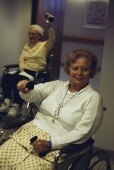
MONDAY, Jan. 10 (HealthDay News) — Widespread nursing home closures over the past decade have resulted in a 5 percent drop in available nursing home beds across the United States, with poor, urban neighborhoods hardest hit, new research reveals.
“The country’s minority population is aging at a steeper rate compared with the white population,” said study lead author Zhanlian Feng, an assistant professor of community health in the Center for Gerontology and Health Care Research at Brown University in Providence, R.I. “And so the potential need for long-term care is rising fastest in minority communities, even as nursing home closings are happening more often in their areas.”
This disproportionate impact of nursing home closings on minority and low-income communities “will have all sorts of implications in terms of access and quality of care issues,” Feng added.
The findings are published in the Jan. 10 online edition and the May 9 print issue of the Archives of Internal Medicine.
To explore nursing home trends, Feng and colleagues analyzed information drawn from the National Online Survey Certification and Reporting database on closings of Medicare- and Medicaid-certified facilities between 1999 and 2008.
During that time, the research team found that 11 percent of stand-alone nursing homes (1,776) and almost half (1,126) of all hospital-based nursing homes in the country shut their doors. Together, they represented a loss of 16 percent of all Medicare/Medicaid-certified nursing homes and nearly 97,000 — or more than 5 percent — of nursing home beds.
Using U.S. Census data from 2000, the authors further noted that overall closure rates were about twice as high in zip codes that are home to low-income and minority (black/Hispanic) communities than in the richest zip codes.
Nursing homes in zip codes comprised primarily of Hispanic or black residents were 37 and 38 percent more likely, respectively, to close than those in areas with the fewest Hispanics or blacks.
While distances to the nearest operating nursing home increased “significantly” in areas that experienced closures, the researchers found the travel increases greatest for those living in poor and minority localities.
The team concluded that nursing homes in minority and low-income communities are bearing the lion’s share of financial pressures and closures, which raises concerns about rapidly diminishing senior care options and the quality of the remaining facilities in those places.
“There are times when placement in a nursing home is unavoidable,” said Dr. Mitchell H. Katz, director of the Los Angeles County Department of Health Services, who wrote an accompanying editorial. “And then what we should want is a high-quality nursing home that is near where a person has lived all their life and where their family and friends are. And what’s disturbing about this investigation is that it shows that nursing home closures are not random. And that they are more likely to occur in low-income neighborhoods.”
Katz said more of the people in low-income neighborhoods who use nursing homes are Medicaid recipients, whose reimbursement rates are lower than the fees of private-pay patients. “So the result is that those places that care for these patients are more likely to close,” he said.
More than 27 million Americans will need long-term care by 2050, nearly twice as many as in 2000, Katz noted. Either the federal government will have to increase the reimbursement rate for nursing home services, or state and federal policies will have to fund less expensive — and perhaps more preferable lifestyle — options, such as assisted living, he concluded.
“That would be sensible, and should not cost more, but it requires a more far-seeing policy approach than what we have now,” he said.
Otherwise, only the wealthy will have access to nursing homes, the authors said.
In a separate study also published online Jan. 10 in Archives of Internal Medicine, investigators from the Institute for Aging Research, which is affiliated with Harvard Medical School, found that a significant amount of Medicare money directed toward the care of nursing home residents with advanced terminal dementia may be wasted on aggressive therapies that offer little practical benefit.
For patients who stand to gain little from rehabilitative services, for example, the researchers suggested redirecting resources toward high-quality palliative care that could provide a more comfortable end-of-life experience.
More information
For more on nursing homes, visit the U.S. National Institute on Aging.

